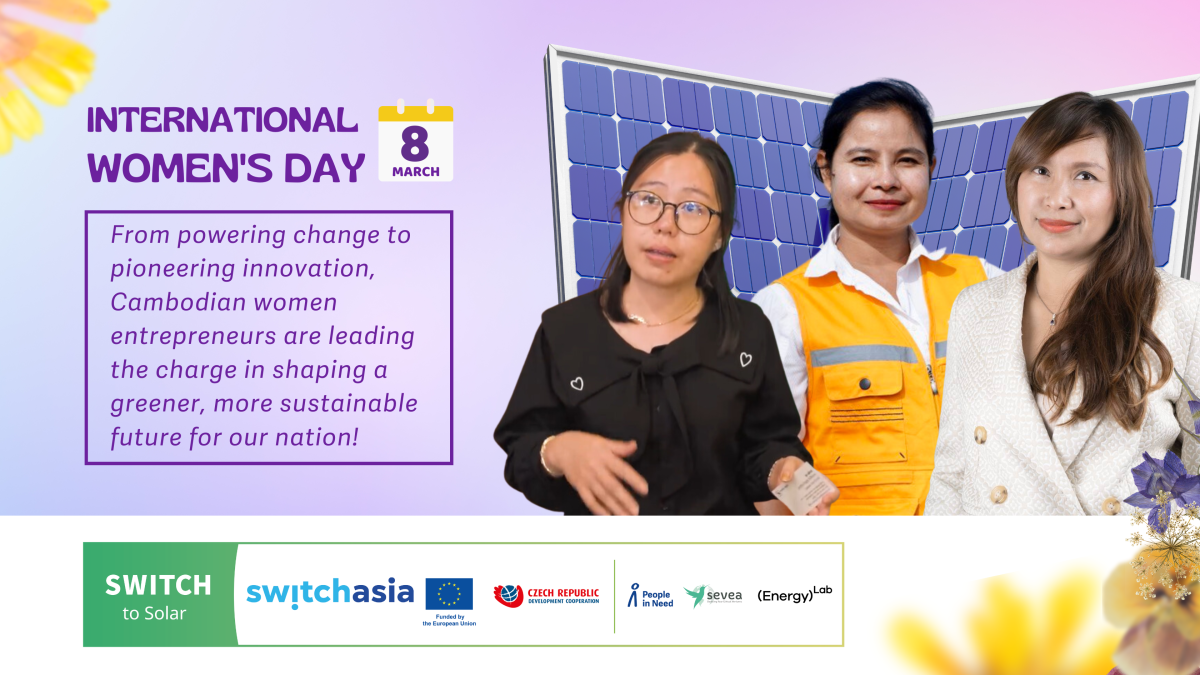Cambodian Women Leading the Transition to Solar Technologies
Published: Mar 7, 2024 Reading time: 3 minutes Share: Share an article
Approximately 60% of Cambodia’s business landscape is women-led. This places Cambodian women at the forefront of the national economy and is among the highest participation rates in the ASEAN region.
These women are actively seeking business opportunities, developing their skills, and contributing to the growth of their enterprises. The renewable energy sector is no different.
In the emerging clean technologies space female entrepreneurs are making significant strides and establishing businesses utilizing solar technologies and contributing to gender equality and economic empowerment. International and domestic organizations, such as People in Need (PIN), EnergyLab, and Sevea, play a crucial role in supporting these entrepreneurs through programs like SWITCH to Solar.
This initiative, funded by the European Union through the SWITCH-Asia Programme and the Government of the Czech Republic through the Czech Development Agency, empowers micro, small, and medium-sized enterprises (MSMEs) in Cambodia to adopt solar energy sources and enhance their business skills.
A leading example among this cohort of solar pioneers is Ms. Chanraksmey Vorn, the CEO of EGE Cambodia Energy Solutions. Despite facing challenges, including ingrained gender biases in the marketplace, Chanraksmey has led EGE to achieve over 10 solar technology installations and secure grant funding from international organizations. She draws inspiration from influential women like her mother, as well as other leading entrepreneurs such as Ms. Thida Kheav, the CEO of Solar Green Energy Cambodia (SOGE).
“Having inspirational women around me is a motivation to continue doing what I do. This passion we share for Cambodia is a foundation to reach that goal”, shared Chanraskmey.
When asked about her own journey in the solar sector, SOGE’s Thida, recounts, among the positives, the remaining challenges faced as a woman with an accounting background in this technical field. Despite these hurdles, Thida emphasises the increasingly positive shift for women entrepreneurs in Cambodia, thanks to the increased opportunities from international organisations.
“It’s great to see the improvement of the situation for women entrepreneurs in Cambodia. More opportunities have opened doors for women entrepreneurs, not only in the renewable energy sector, but the overall entrepreneurship ecosystem”, expressed Thida.
Of course, challenges abound throughout industry, and one such challenge in recent memory was the COVID-19 pandemic. Soukhim Im, Co-founder of Harvest the Sun, contributes to sustainable production and food security through solar dryer technology. Soukhim's company faced pandemic induced challenges alongside the need to change traditional mindsets in the agricultural sector. However, her dedication and clients' trust motivate her to improve Cambodia's food processing industry.
“I am very proud of my team for fighting through the COVID-19 pandemic and most especially, being recognised within 2 years of operation as a certified supplier of solar dryer in Cambodia. This is indeed a good achievement for us”, shared Soukhim.
Despite these diverse challenges, Chanraksmey, Thida, and Soukhim offer valuable advice to aspiring businesswomen. Chanraksmey emphasises the importance of genuine passion, Thida encourages going beyond comfort zones, and Soukhim stresses consistency, learning, and building a passion for one's pursuits.
Collectively, these women are pioneers in Cambodia's renewable energy sector, using their businesses to contribute to sustainable development and empower other women. Their stories serve as inspiration, showcasing the potential for women to overcome obstacles and thrive in the entrepreneurial landscape.
The support from initiatives like SWITCH to Solar further fuels their success and encourages more international organizations to invest in women-led startups and businesses. Cambodia is witnessing a surge in successful women entrepreneurs leveraging technology and innovation, making significant contributions to the country's economic and social development. Challenges persist, but stakeholders are actively working to empower and support women in their entrepreneurial endeavors, creating a more equitable and inclusive business environment.


